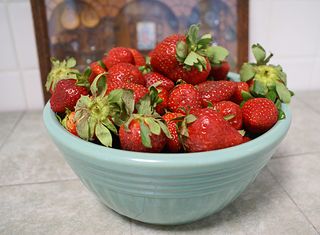
Strawberry season in Mexico! This 70-year-old mixing bowl holds one and a half kilos of sweet, ripe fruit. At the tianguis (street market) where Mexico Cooks! shops, the price per kilo of strawberries is usually 25 pesos, or approximately $1.00 USD per pound.
A couple of weeks ago, Mexico Cooks! was tickled to receive a phone call from our old friend Steve Sando, red-hot heirloom bean empresario Rancho Gordo. "Hey, I'm in town for the day on my way to Mérida–you busy?" Of course we are never too busy for a visit from Steve and we immediately made plans for a long visit over midday comida (the main meal of the day in Mexico).
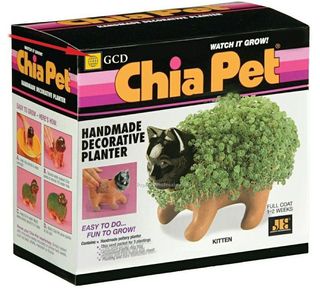
During the course of our table conversation, we somehow got around to the topic of chía, a product that's fairly newly available from Rancho Gordo. Chía, a species of mint, is grown for its seeds. If you've been around as long as Mexico Cooks! has, you'll remember the chía pet: spread dampened chía seeds all over a little clay animal filled with water and in just a few days, bingo, you have an animal covered with pretty green living fur–the chía plant. Our first memory of one of these novelties was called Paddy O'Hair.
However, chía has been around far longer than Paddy O'Hair or the current chía pet. The ancient peoples of what is now Mexico discovered its extraordinary health properties thousands of years ago. Chía seed may be eaten raw as a whole seed, providing protein, fiber, and fats (including Omega 3), as well as certain essential minerals. Ground chía seed is sometimes added to pinole, a coarse flour made from toasted corn kernels. Chía seeds placed in water or fruit juice are consumed in Mexico and known as chía fresca. The soaked seeds are gelatinous in texture and are used in combination with other cereals. Ground chía seed is often used in baked goods, including some commercially produced breads and cakes.
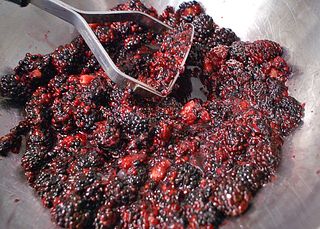
This week, one of the tianguis vendors offered big-as-the-ball-of-my-thumb, sweet, fresh Michoacán-grown zarzamora (blackberries) for only 20 pesos per kilo–that works out to slightly over 9 pesos per pound. That's about 75 cents per pound. Blackberries are my absolute favorite fruit to add to yoghurt, so you can guess what I bought. I prepare them exactly as I do strawberries.
A year or so ago, Mexico Cooks! decided to add chía seeds to our morning breakfast yoghurt. Most yoghurt in Mexico is heavily sweetened with sugar, artificially flavored, and is nearly a drinkable consistency. I prefer a product that starts out sugar-free, is naturally flavored, and is thick enough to eat with a spoon. I started experimenting and came up with the following recipe.
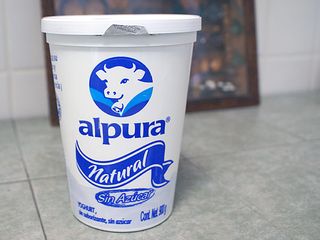
Alpura brand yoghurt is available almost everywhere in central Mexico. Many Mexican yoghurt brands are labeled "all natural", but even those without added flavorings contain a lot of sugar. Alpura is, as far as Mexico Cooks! knows, the only national brand yoghurt that contains no sugar or artificial flavorings. In the United States, Canada, and other countries, you'll be able to choose from several brands. Or, of course, you can make your own plain yoghurt.
Mexico Cooks!-Style Yoghurt with Fresh Strawberries and Chía
Ingredients
2 quarts plain (unsweetened and unflavored) yoghurt
1 kilo (2.2 pounds) fresh strawberries, washed and hulled
1/4 tsp salt (optional)
Sweetener to taste (Rancho Gordo piloncillo, granulated sugar, or artificial sweetener)
1/2 cup chía seeds
Procedure
Cut the strawberries in half and place in a large bowl. Add the sweetener of your choice to the strawberries. Mexico Cooks! uses artificial sweetener due to dietary restrictions, but Rancho Gordo piloncillo would be far tastier. Mash the berries (I use that heavy-duty metal bean masher in the photo) until some of the juice comes up, but leave most of the berry halves whole or nearly whole.
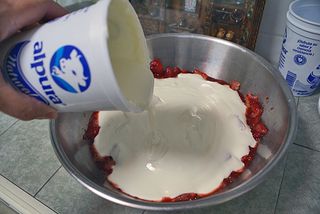
Add the salt and the yoghurt and stir until well-mixed.
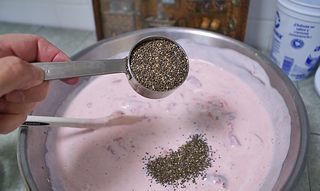
Add the chía seeds and mix again.
I package the finished yoghurt in recycled 900-gram Alpura containers. This recipe yields three filled containers plus 2 cups, or approximately 3 liters of strawberry/chía yoghurt. Once the yoghurt is packaged, allow it to rest overnight so that the chía will develop its gelatinous consistency and thicken the yoghurt.
Approximate nutritional information for a one-cup serving sweetened with artificial sweetener
Calories…………….110
Protein……………..5 grams
Fats………………..6 grams
Calcium…………….120 mg
Sodium………………60 mg
Carbohydrates……….12 grams
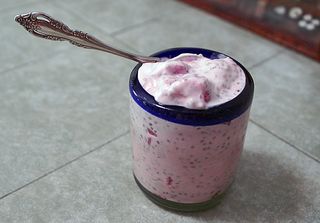
Breakfast: approximately one cup of yoghurt, strawberries, and chía. After resting overnight, the chía has become gelatinous and gives substantial thickness to the yoghurt. Three kilos plus two cups of this mixture is enough for about two weeks worth of breakfasts.
Looking for a tailored-to-your-interests specialized tour in Mexico? Click here: Tours.
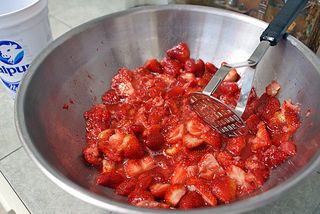
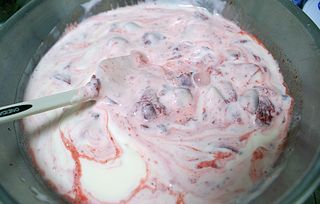
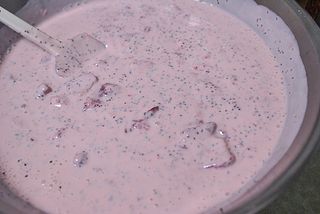
Leave a Reply